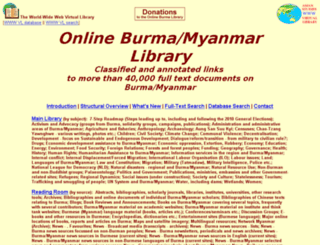Focal point
Location
The Online Burma/Myanmar Library (OBL) is a non-profit online research library mainly in English and Burmese serving academics, activists, diplomats, NGOs, CSOs, CBOs and other Burmese and international actors. It is also, of course, open to the general public. Though we provide lists of Burma/Myanmar news sources, the Library’s main content is not news but in-depth articles, reports, laws, videos and links to other websites, We provide a search engine (database and full text) and an alphabetical list of categories and sub-categories, but the Library is best accessed through browsing the 100 or so categories which lead to sub- and sub-sub categories. These tools should be used in combination.
Members:
Resources
Displaying 886 - 890 of 1151Pa-O Relocated to Thailand: Views from Within
The Pa-O are one of the ethnic minorities of Burma. They live primarily in the Taunggyi area of southwestern Shan State. A smaller number live in the Thaton area of Mon State in Lower Burma. The Pa-O in the Thaton area have become "Burmanized" -- like their neighbors the Mon and Karen, they have adopted Burmese language, dress and customs. The Pa-O in southwestern Shan State have learned to speak Shan, but have maintained their own distinct language and customs, including their traditional dark blue or black dress.
A Village on Fire: the Destruction of Rural Life in Southeastern Burma
...Under military control, rural Burma's subsistence farming village is losing its viability as the basic unit of society. Internally displaced people are usually thought to have fled military battles in and around their villages, but this paradigm doesn't apply to Burma. In the thousands of interviews conducted by the Karen Human Rights Group with villagers who have fled their homes, approximately 95 percent say they have not fled military battles, but rather the systematic destruction of their ability to survive, caused by demands and retaliations inflicted on them by the SPDC military.
KHRG Commentary #2000-C2
The worsening situation of the internally displaced in all northern Karen districts, forced labour and convict porters, rice quotas, the desperate situation of rank-and-file SPDC soldiers, forced repatriation of refugees in Thailand, and the SPDC's persistence in denying that there is any problem whatsoever.
Peace Villages and Hiding Villages: Roads, Relocations, and the Campaign for Control in Toungoo District
Roads, Relocations, and the Campaign for Control in Toungoo District. Based on interviews and field reports from KHRG field researchers in this northern Karen district, looks at the phenomenon of 'Peace Villages' under SPDC control and 'Hiding Villages' in the hills; while the 'Hiding Villages' are being systematically destroyed and their villagers hunted and captured, the 'Peace Villages' face so many demands for forced labour and extortion that many ofthem are fleeing to the hills.
SPDC & DKBA Orders to Villages: Set 2000-B
Pa'an, Dooplaya, Toungoo, Papun, & Thaton Districts. Over 250 orders dating from mid-1999 through late September 2000, the vast majority of them from the latter half of that period. Includes restrictions on the movement of villagers, forced relocation, demands for forced labour, extortion of money, food, and materials, threats to villagers and other demands, as well as documents related to rice quotas which farmers are forced to give, education and health.


